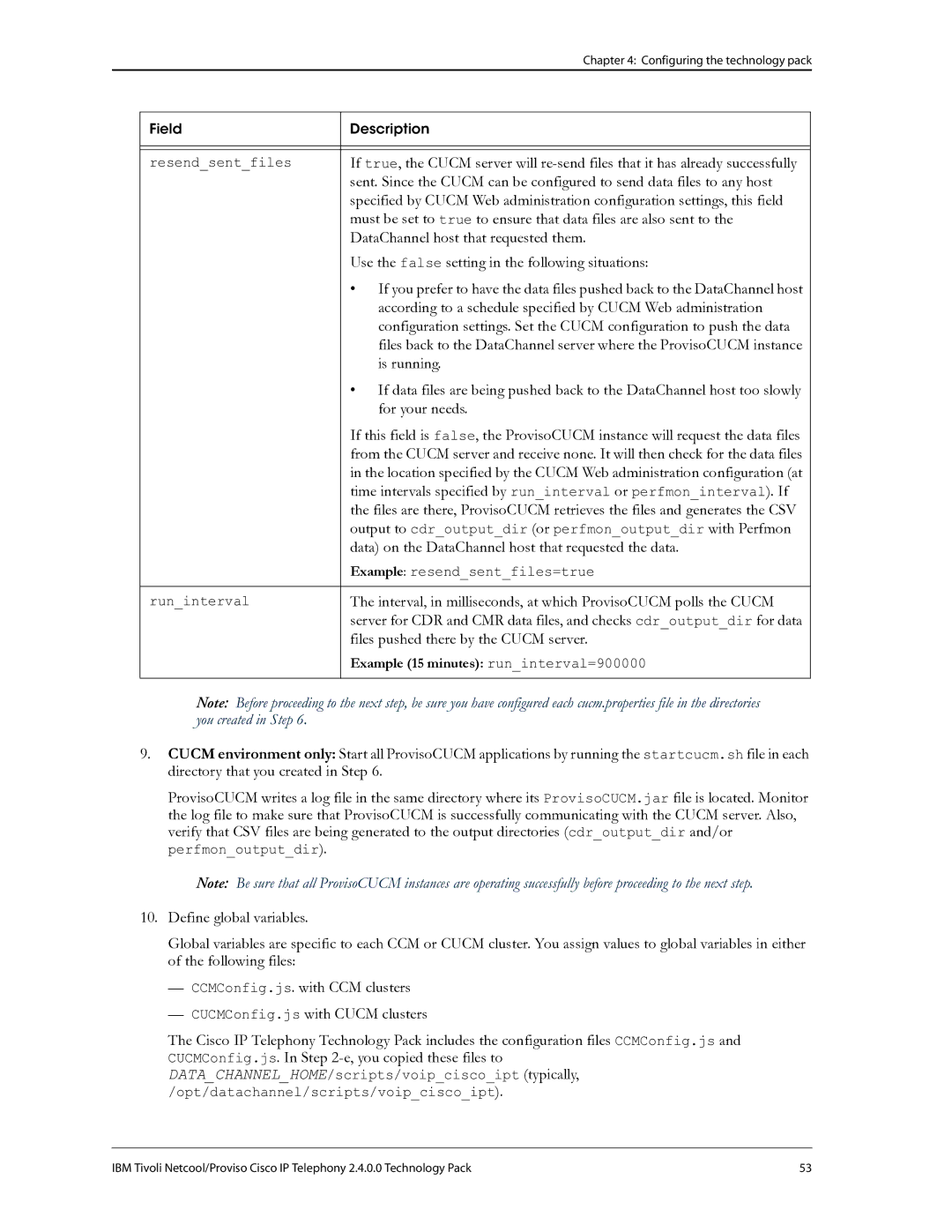|
| Chapter 4: Configuring the technology pack |
|
|
|
| Field | Description |
|
|
|
|
|
|
| resend_sent_files | If true, the CUCM server will |
|
| sent. Since the CUCM can be configured to send data files to any host |
|
| specified by CUCM Web administration configuration settings, this field |
|
| must be set to true to ensure that data files are also sent to the |
|
| DataChannel host that requested them. |
|
| Use the false setting in the following situations: |
|
| • If you prefer to have the data files pushed back to the DataChannel host |
|
| according to a schedule specified by CUCM Web administration |
|
| configuration settings. Set the CUCM configuration to push the data |
|
| files back to the DataChannel server where the ProvisoCUCM instance |
|
| is running. |
|
| • If data files are being pushed back to the DataChannel host too slowly |
|
| for your needs. |
|
| If this field is false, the ProvisoCUCM instance will request the data files |
|
| from the CUCM server and receive none. It will then check for the data files |
|
| in the location specified by the CUCM Web administration configuration (at |
|
| time intervals specified by run_interval or perfmon_interval). If |
|
| the files are there, ProvisoCUCM retrieves the files and generates the CSV |
|
| output to cdr_output_dir (or perfmon_output_dir with Perfmon |
|
| data) on the DataChannel host that requested the data. |
|
| Example: resend_sent_files=true |
| run_interval | The interval, in milliseconds, at which ProvisoCUCM polls the CUCM |
|
| server for CDR and CMR data files, and checks cdr_output_dir for data |
|
| files pushed there by the CUCM server. |
|
| Example (15 minutes): run_interval=900000 |
Note: Before proceeding to the next step, be sure you have configured each cucm.properties file in the directories you created in Step 6.
9.CUCM environment only: Start all ProvisoCUCM applications by running the startcucm.sh file in each directory that you created in Step 6.
ProvisoCUCM writes a log file in the same directory where its ProvisoCUCM.jar file is located. Monitor the log file to make sure that ProvisoCUCM is successfully communicating with the CUCM server. Also, verify that CSV files are being generated to the output directories (cdr_output_dir and/or perfmon_output_dir).
Note: Be sure that all ProvisoCUCM instances are operating successfully before proceeding to the next step.
10.Define global variables.
Global variables are specific to each CCM or CUCM cluster. You assign values to global variables in either of the following files:
—CCMConfig.js. with CCM clusters
—CUCMConfig.js with CUCM clusters
The Cisco IP Telephony Technology Pack includes the configuration files CCMConfig.js and CUCMConfig.js. In Step
DATA_CHANNEL_HOME/scripts/voip_cisco_ipt (typically, /opt/datachannel/scripts/voip_cisco_ipt).
IBM Tivoli Netcool/Proviso Cisco IP Telephony 2.4.0.0 Technology Pack | 53 |
